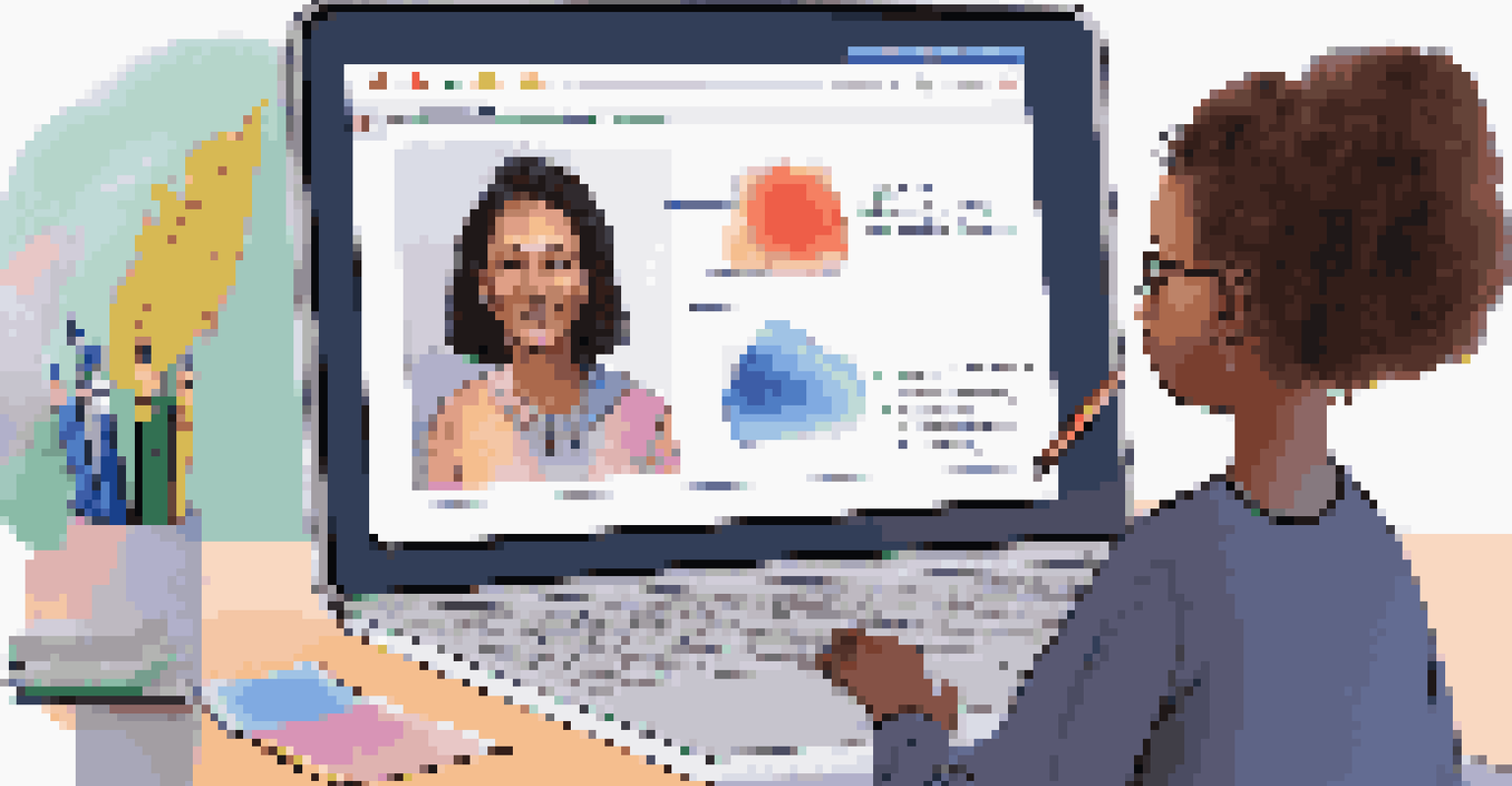The Value of Self-Reflection in Online Student Assessments

Understanding Self-Reflection in Education
Self-reflection is the process of looking inward to evaluate your thoughts and actions. In education, it's a powerful tool that allows students to assess their understanding and performance. By taking the time to reflect, students can identify their strengths and weaknesses, paving the way for meaningful growth.
We do not learn from experience... we learn from reflecting on experience.
When students engage in self-reflection, they become active participants in their learning journey. This practice not only encourages accountability but also fosters a deeper connection with their studies. As they ponder their experiences, students can uncover insights that might otherwise go unnoticed.
For instance, a student who reflects on a recent project may realize they excelled in research but struggled with time management. This awareness is crucial as it helps them tailor their future strategies, enhancing their overall academic performance.
The Role of Self-Reflection in Online Assessments
Online assessments often lack the personal touch of traditional classrooms, making self-reflection even more vital. In a virtual setting, students might feel detached from their learning, but self-reflection can bridge that gap. It encourages them to think critically about their performance and experience.

By integrating self-reflection into online assessments, educators can create a more holistic evaluation process. Students can review their responses, consider their thought processes, and learn from their mistakes. This approach not only enhances learning but also promotes a sense of ownership over their education.
Self-Reflection Enhances Learning
Engaging in self-reflection allows students to assess their strengths and weaknesses, leading to meaningful personal growth.
For example, after completing an online exam, a student might take time to analyze their answers. They could reflect on why they chose certain responses and how they could improve next time. This practice reinforces learning and ensures that students remain engaged and invested in their progress.
Benefits of Self-Reflection for Student Growth
Self-reflection nurtures essential skills that extend beyond academics. It cultivates critical thinking, self-assessment, and even emotional intelligence, all of which are invaluable in today’s world. When students learn to evaluate their own work, they become more adaptable and resilient.
The greatest discovery of my generation is that a human being can alter his life by altering his attitude.
Moreover, self-reflection can lead to increased motivation. As students recognize their accomplishments and areas for improvement, they are often inspired to set new goals. This cycle of reflection and goal-setting keeps them engaged and pushes them to strive for excellence.
For instance, a student who reflects on their progress might feel empowered to tackle a challenging subject or project. This newfound confidence often leads to a more proactive approach to learning, transforming obstacles into opportunities for growth.
Self-Reflection: A Tool for Enhancing Learning Strategies
Incorporating self-reflection into learning strategies can significantly enhance a student’s educational experience. It allows them to assess not just what they learned, but also how they learned it. This understanding can lead to more effective study habits and learning techniques.
When students reflect on their learning styles—be it visual, auditory, or kinesthetic—they can tailor their study practices accordingly. For example, a student who realizes they retain information better through visual aids might start using more diagrams and charts in their studies.
Boosting Engagement in Online Learning
Incorporating self-reflection in online assessments helps students feel more connected and accountable for their learning.
This personalized approach not only boosts comprehension but also makes learning more enjoyable. By taking ownership of their educational journey, students become empowered to experiment with different methods and find what works best for them.
Encouraging Self-Reflection in Online Learning Environments
To foster self-reflection among students, educators can incorporate specific strategies into their online courses. Simple prompts, such as reflective questions or journaling exercises, can encourage students to pause and think critically about their learning experiences. This practice not only enriches their understanding but also makes assessments more meaningful.
Additionally, providing feedback that encourages self-reflection can be incredibly beneficial. Instead of simply grading assignments, educators can ask students to evaluate their work and suggest areas for improvement. This interactive approach prompts students to think deeply about their learning process and outcomes.
For example, an instructor might ask, 'What was your thought process behind this answer?' This question invites students to reflect on their reasoning and decisions, fostering a culture of self-improvement and continuous learning.
Overcoming Challenges in Self-Reflection
While self-reflection offers numerous benefits, it can also present challenges for some students. Many may feel uncomfortable or unsure about evaluating their own performance, especially if they are used to external validation. It's essential to create a supportive environment that encourages open dialogue about self-reflection.
Educators can help by introducing self-reflection gradually, starting with guided questions and structured exercises. As students become more accustomed to the process, they can begin to develop their own reflective practices, making it a natural part of their learning journey.
Fostering Lifelong Learning Skills
Self-reflection nurtures critical thinking and adaptability, essential skills for navigating the evolving job market.
Moreover, sharing success stories of other students who have benefited from self-reflection can inspire and motivate. When learners see tangible examples of how introspection leads to growth, they may be more willing to engage in the process themselves.
The Future of Self-Reflection in Education
As education continues to evolve, the role of self-reflection is likely to grow. With the rise of personalized learning and technology-enhanced education, opportunities for students to engage in self-reflection will only increase. Tools like digital portfolios and interactive learning platforms can facilitate this practice.
Moreover, as the importance of lifelong learning becomes more recognized, self-reflection will play a crucial role in helping individuals continually assess their skills and knowledge. This ongoing evaluation will be essential in navigating the ever-changing landscape of the job market.

Ultimately, fostering a culture of self-reflection in education can empower students to become proactive learners and critical thinkers. By embracing this practice, we can equip them with the tools they need to succeed, not just academically, but in all aspects of life.